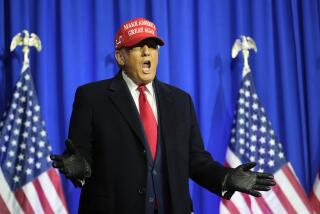Administration Weighs Trade Bill Tactics : May Ask Congress to Take Controversial Aspects Out of Measure
WASHINGTON — Treasury Secretary James A. Baker III Monday attacked several features of the trade bill that congressional negotiators will take up later this month, but the Reagan Administration is still struggling to find the best strategy for bargaining with Congress over the far-reaching legislation.
A senior Administration official suggested in an interview that the White House might attempt to persuade lawmakers to trim the legislation back to its central trade aspects and to pose separately such controversial measures as plant closing rules, repeal of the oil industry’s windfall profits tax and multilateral lending to Third World nations. “I really do believe we could bridge the gap between us if we could deal with just the trade elements of the bill,” said the senior official, who asked to remain anonymous.
Baker, in a speech to the Institute for International Economics, said that Congress is in danger of making “the same mistakes with the current trade bill that it did with the Smoot-Hawley tariff in 1930,” which has been widely blamed as a major factor in the Great Depression of the 1930s.
Administration on Defensive
But Administration officials acknowledge that they are on the defensive in their efforts to knock out many of the protectionist features of the bill they find offensive, because the continuing large trade deficits have offered Democrats a promising campaign issue in next year’s election. Last week, the Commerce Department reported that the trade deficit widened to a record $16.5 billion in July, although almost all the increase was because of temporary factors.
“It’s all politics now,” one Administration official conceded. “The major sticking points are the majority leader in the Senate and the Speaker of the House.”
Some White House officials, pointing out the dangers of a confrontational approach to Congress, argue that the Democratic leadership on Capitol Hill would reject any immediate effort to limit the bill to trade issues alone. They suggested waiting at least a month before proposing such an unorthodox alternative, to see if House and Senate bargainers bog down in their efforts to forge a compromise between the two competing versions of the complex trade bill.
By treating the trade aspects of the bill separately, the Administration would be able to deal more directly with House Ways and Means Committee Chairman Dan Rostenkowski (D-Ill.) and Senate Finance Committee Chairman Lloyd Bentsen (D-Tex.), who are considered more interested than some of their colleagues in cooperating with the White House to get a trade bill. They could avoid the wide variety of demands from other lawmakers representing committees that also are involved in other aspects of the legislation.
Walks Delicate Line
Baker, in his speech, appeared to be walking a delicate line between offering to compromise with Congress and threatening a presidential veto of the measure. As pressure mounts for some action to address the nation’s trade problem, the Administration is caught between its desire for Congress to authorize international trade negotiations and its fears that lawmakers will attach measures that would draw trade retaliation from other nations.
“We are recommending major changes in the bill before it gets to the President,” Baker told the gathering of about 200 economists, government officials and business leaders. “I assure you he will not sign a bill that throws up trade barriers and wrecks our vast network of commercial relationships.”
But Baker, who will lead the Administration’s bargaining effort on the trade bill, conceded: “In politics, you can’t fight something with nothing. We can tout the virtues of free trade till the cows come home--and still be rolled by the forces of protectionism--because they offer more than talk. They offer concrete action, even though it is very, very negative and counterproductive action.”
In trying to fight “something” with “something,” the Administration intends to stress Baker’s ongoing prodding of West Germany and Japan to stimulate their own economic growth to help absorb more of the world’s exports and thereby reduce the U.S. trade deficit without a worldwide recession.
Baker Increases Pressure
But, so far, German officials have resisted stimulative measures. Baker stepped up the pressure Monday on Germany in advance of an important meeting in Washington later this month of top economic officials from the seven leading industrial democracies.
Speaking to an audience that included former West German Economics Minister Otto Lambsdorff, Baker could not resist a further dig at Germany’s reluctance to put its long-planned tax cuts into effect before 1990. Pointing out that Canada, Germany and France are all considering lower tax rates in the wake of last year’s U.S. income tax revision, Baker departed from his prepared text with a sly grin at Lambsdorff to add: “We would like to hope that some would follow it to a greater degree.”
And, in an indirect reference to Germany’s weak domestic economic growth over the last year, Baker said: “Industrial nations must avoid widely differing rates of growth, which contribute to trade imbalances. Balanced growth, in other words, is an antidote to protectionism.”
More to Read
Get the L.A. Times Politics newsletter
Deeply reported insights into legislation, politics and policy from Sacramento, Washington and beyond. In your inbox three times per week.
You may occasionally receive promotional content from the Los Angeles Times.










